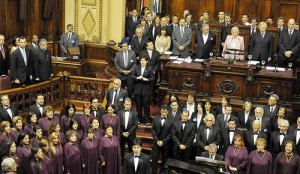On March 1, José Mujica -also referred to as “El Pepe” by many Uruguayans- was sworn in as the new president of Uruguay. He succeeds Tabaré Vázquez from the same left-leaning coalition party, Frente Amplio (Broad Front). During and after the inauguration ceremonies, Uruguayan bloggers and Twitter users reflected on this presidential transition and what it means for their country.
Ana Rita Franco from the blog Nostalgia de Emigrante [es] writes about the public opinion surrounding Mujica and her own impressions of the new President:
Mucho se ha dicho a favor y en contra de su persona. Desde mi punto de vista creo que ha sido el politico por estos tiempos, que ha generado con su sola presencia, sentimientos muy ambivalentes: se lo idolatra o se lo detesta. Por eso hay quienes se enorgullecen y otros se averguenzan. Desde mi posicion que no es ni una ni otra, se ha ganado mi respeto por haber llegado donde hoy se encuentra, dandonos la leccion de que todos los suenos pueden ser cumplidos.

Mujica stands to the right of his wife Lucía Topolanski, head of the senate. Picture uploaded by flickr user Fernando Lugo APC and used under a Creative Commons license.
Mujica has captured the attention of the world because of his background as a former Tupamaro guerrilla fighter. Víctor Bagnuoli, director of the blog Visión Universitaria [es], explains that Mujica has left that past behind and taken a more realistic approach to achieving his political ideals.
Luego de haberse jugado la vida en pos de ideales revolucionarios por medios ilegales, don Pepe Mujica hizo una profunda evolución que lo llevó, no a abandonar sus ideales pero sí, a comprender la realidad y a plantear metas factibles de corto y mediano plazo, ya que la coyuntura nacional e internacional obligan a buscar otras alternativas.
Constanza Moreira [es], a political scientists from the University of the Republic in Montevideo explains in the same blog that Mujica comes into power accompanied by an environment of very high expectations:
Será asimismo el tercer presidente electo del siglo XXI. Y el electo con el mayor porcentaje de votos, con la excepción de Baldomir (61,3% en 1938), Amézaga (57,2% en 1942) y Jorge Batlle (54%).
Muchas expectativas se ciernen sobre el nuevo presidente. Quizá más de las esperables, recordando que el gobierno de un país es algo más que un presidente, y recordando siempre es bueno las limitaciones de la humana condición.
He will be the third elected president of the XXI century. And the one elected with the greatest percentage of votes, with the exception of Baldomir (61.3% in 1938), Amézaga (57.2% in 1942) y Jorge Batlle (54%).
A lot of expectations are upon the new president. Maybe more than what can be expected, remembering that the government of a country is made up of more than one president, and remembering –it is always good to do so- the limitations of the human condition.
Moreira also adds that the highest expectations for Mujica come from the poorest Uruguayans:
En buena medida, Mujica es, con su propia vida, un representante “de los de abajo”. Y son estos miles de uruguayos, que lo han honrado con su voto una y otra vez, quienes más esperarán de un gobierno de Mujica.

Mujica and Frente Amplio supporters celebrating election on November 29, 2009. Photo uploaded by flickr user camerareporter and user under a Creative Commons license.
As for the ceremony and inauguration speech itself, the writers at Uruguayan blog Opinemos Hoy [es] did not come away as politically energized as they had hoped to be:
Ahora bien la primera imagen que me dejó toda la asunción (seguida por tv haciendo zapping entre el 4,10 y 12) es un Mujica cansado , cansado antes de arrancar , lo podemos acusar a su edad , pero no inyectó esa energía que necesita su gente , su pueblo sus seguidores , fueron discursos diferentes y me dió la impresión que opuestos , lo más importante lo dijo al principio en la asunción en la cámara de representantes mediante una carta leída la cual trataba varios temas yá conocidos por todos nosotros , como es la educación, seguridad , energía y el agrointeligente. […]
En fin una jornada que deja mucho por ver y mucho visto, por el momento solo resta esperar a ver que pasa , mucha ilusión y fanatísmo en la gente frenteamplista , ahora politicos Uruguayos a no defraudar.
Now the first image that the entire inauguration (followed on television surfing through channels 4, 10, and 12) left me is one of a tired Mujica, tired before taking off, we can attribute that to his age, but he didn’t inject that energy his people, his country and his followers need, they were different speeches and seemed opposites to me, the most important thing he said at the beginning in the chamber of representatives through a letter he read, which talked about various issues of which we are all already aware, like education, security, energy, and agro-intelligence.
Anyway, it was an event that left a lot to be seen and a lot that was seen, for the moment we just have to wait and see what happens, a lot of hopes and fanaticism from the Frente Amplio supporters, now Uruguayan politicians, don’t let us down.
Others thought Mujica’s speech was praiseworthy, like Mexican Twitter user @mostacho who wrote:
Escuchando el discurso de Mujica, que envidia los uruguayos,cuando nos tocará tener esa calidad de dirigentes y esa sociedad en México..
A Uruguayan user on Twitter, @gaaviota, showed her support for her new president:
Estoy orgullosa de tener un lider como Pepe Mujica en mi pais. Vuelven los hijos de Artigas!!!
Mikaela Mia @mikiynick sent a message to Mujica through Twitter, reflecting what many Uruguayans feel -even those that did not vote for him:
José Mujica : te dejo al mando de mi país querido Uruguay. Cuidalo y mejoralo.. con amor: una uruguaya más :D







2 comments
we are thrilled about the vibrancy of DEMOCRACY. PHILIP